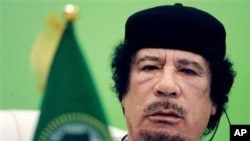The former director of governance at the United Nations Economic Commission for Africa questions why African leaders and the African Union have been “alarmingly silent” about the crisis in Libya following what he describes as the grave human rights abuses perpetrated by forces loyal to Moammar Gadhafi.
Okey Onyejekwe says a number of people across Africa are surprised and embarrassed that the continental body has failed to back Libya’s anti-government protesters who want democracy in their country.
“A number of people are quite surprised that the African Union and African states have been rather quiet on the goings on in North Africa and particularly recently in Libya. The issue here for me is that we in the continent should indentify with what is going on because we started the path of democratization on the fall of the Berlin Wall, in which African masses were beginning to demand the say-so in their affairs of the state and how they were governed.”
Officials of the African Union have yet to comment officially on the crisis in Libya, as anti-government protesters demand reforms and Gadhafi’s ouster after 42 years of rule.
“One of the challenges which African states have to address in this decade is the issue of becoming relevant players in global politics and on the reaction to what is going on in Libya, particularly the fact that unarmed civilians, who were simply asking for their basic rights, were being gunned down,” said Onyejekwe.
“Something which we in the African Union should join the rest of the world because across Asia, across Europe, there is total condemnation. And then, if we must become active players and be taken seriously in global politics, we need to have our voices heard on issues like this.”
Onyejekwe says it is unfortunate Africa’s leaders remain silent in the face of the ongoing crisis in Libya.
“There are quite a number of views on what some people have called alarming, deafening silence on taking a position, at the very least, on condemnation of the reaction of the Libyan government to the peaceful demonstrators. A number of people have speculated that some African states have identified with Gadhafi and are quite reluctant to be critical,” said Onyejekwe.
“Others have said that he [Gadhafi] has deep pockets [and he] has a lot of investments in several African countries, and they are quite also reticent based on this factor. But, it is misplaced given the fact that these are human rights issues, basic issues of decency, especially in the sense that African states themselves…have affirmed commitment to good governance and democratization.”
Recently, Jean Ping the African Union Commission chief condemned what he described as the “disproportionate use of force” against Libyan anti-government protesters. But, critics say the continental body has been ineffective in handling the crisis in Libya.
Meanwhile, in a Monday interview with several Western news organizations, Gadhafi said he cannot step down because he holds no official government position.




